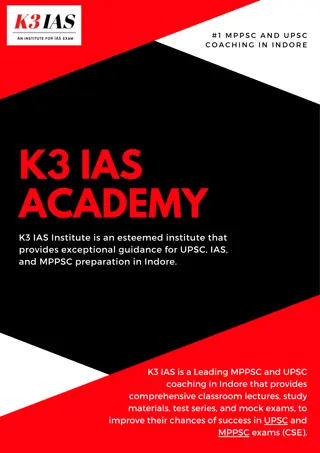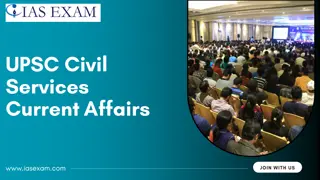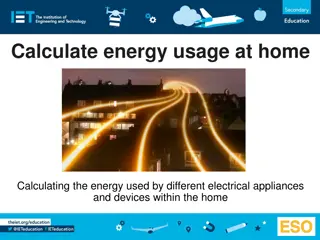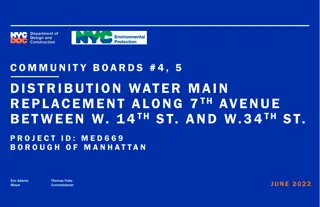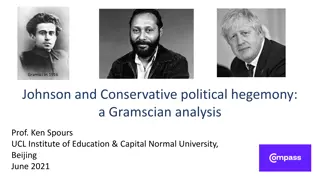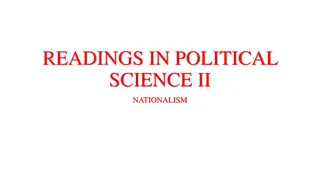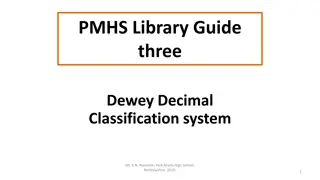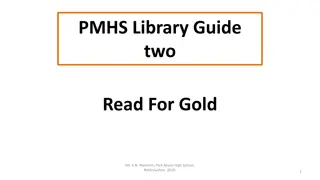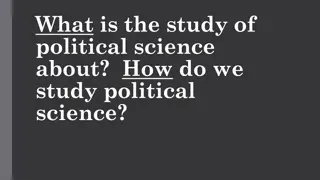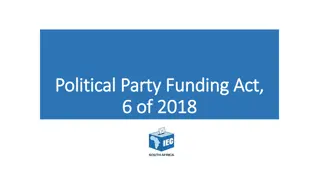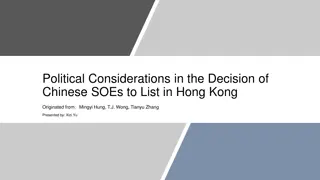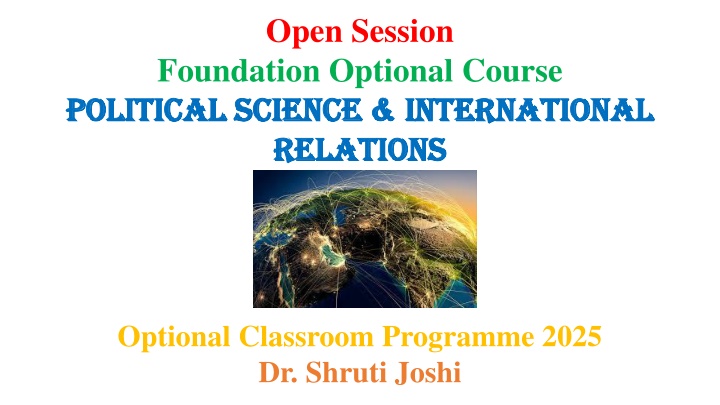
Deciding Optional in UPSC Mains: Key Factors and Why Choose Political Science
The key factors to consider when deciding an optional subject for UPSC Mains include interest, relevance, preparation level, scoring potential, and syllabus structure. Political Science and International Relations (PSIR) stand out as an ideal choice due to its high scoring potential, non-technical nature, and relevance to UPSC exam preparation. The overlap with Prelims syllabus and significant number of questions from PSIR topics make it a strategic option for aspirants.
Download Presentation

Please find below an Image/Link to download the presentation.
The content on the website is provided AS IS for your information and personal use only. It may not be sold, licensed, or shared on other websites without obtaining consent from the author. If you encounter any issues during the download, it is possible that the publisher has removed the file from their server.
You are allowed to download the files provided on this website for personal or commercial use, subject to the condition that they are used lawfully. All files are the property of their respective owners.
The content on the website is provided AS IS for your information and personal use only. It may not be sold, licensed, or shared on other websites without obtaining consent from the author.
E N D
Presentation Transcript
Open Session Foundation Optional Course POLITICAL SCIENCE & International POLITICAL SCIENCE & International Relations Relations Optional Classroom Programme 2025 Dr. Shruti Joshi
1) Factors for deciding optional in UPSC Mains What are the key factors one should consider while deciding an optional in Mains: Interest Relevance during preparation At level of Prelims At level of Mains At level of Personality test Familiarity Space for innovation
2)Why to opt Political Science and International Relations (PSIR) as a Mains optional? (i)High Scoring Potential: How? PSIR has a well-defined/ structured syllabus. Relatively straightforward, easily understood and familiar concepts. Syllabus is clear and not very elaborate (against the common perception that syllabus of PSIR is very wide (ii)Being a non technical subject, easily comprehendible even by non humanities students.
(iii) Relevant for UPSC Pre Preparation--- Prelims syllabus Overlap with PSIR syllabus Section-wise Number of Questions (Paper 1, Section B-- Indian Government and Politics) Indian Polity and Governance- Constitution, Political System, Panchayati Raj, Public Policy, Rights Issues, etc. 2 2 13 3 Ancient History 9 Medieval History 28 Modern History Art and culture Economics Environment 14 Geography IR 4 Polity & Goverance Science & Technology This year around 14 questions came from Polity. Current Affairs 16 15 Miscellaneous 3
Polity Prelims 2024 Delimitation literally means the act or process of fixing limits or boundaries of territorial constituencies in a country or a province having a legislative body. The job of delimitation is a Difficulty Nature Source Question Explanation How many Delimita 1) International Relations (IR) is all about understanding how countries cooperate, compete, and manage their relationships on the global stage. correct about the Constitution of India? 1. Powers of the Municipalities are given in Part IX A of the Constitution. 2. Emergency provisions are given in Part XVIII of the Constitution. 3. Provisions related to the amendment of the Constitution are given in Part XX of the Constitution. Select the answer using the code given below : (a) 1 and 2 only (b) 2 and 3 only (c) 1 and 3 only (d) 1, 2 and 3 The procedure of amendment in the constitution is laid down in Part XX (Article 368) of the Constitution of India. Hence, statement 3 is correct. Indian constitution is the world's lengthiest written constitution had 395 articles in 22 parts and 8 schedules at the time of commencement. Now the Constitution of India has 448 articles in 25 parts and 12 schedules. 1) Which of the following statements are Easy Factual M laxmikant Chapter on Salient Features of the Constitution 2023050195.p df (s3waas.gov.i n) Part IX-A of the Indian constitution deals with municipalities, its composition, powers, etc. It was added by the 74th amendment act of the Indian Constitution. The 74th amendment act was introduced in 1992. It came into force on 1st June 1993. Hence, statement 1 is correct. Part XVIII of the Indian constitution envisages the following three emergencies: General Emergency (also called national emergency) constitutional machinery in the states -(also called state emergency) Financial Emergency. Hence, statement 2 is correct. Break-down of Answer: D
Polity Prelims 2024 Explanation Difficulty Nature Source 1) International Relations (IR) is all about understanding Question How many Delimita A writ of prohibition is issued by a Court to prohibit the lower courts, tribunals and other quasi-judicial authorities from doing something beyond their authority. It is issued to direct inactivity and thus differs from mandamus which directs activity. 23)A Writ of Prohibition is an order issued by the Supreme Court or High Courts to : Easy Factual M Laxmikant chapter on Fundamental Rights (a) a government officer prohibiting him from taking a particular action. (b) the Parliament/Legislative Assembly to pass a law on Prohibition. (c) the lower court prohibiting continuation of proceedings in a case. The writ of prohibition can be issued only against judicial and quasijudicial authorities. It is not available against administrative authorities, legislative bodies, and private individuals or bodies. Hence, option (c) is the correct answer. (d) the Government prohibiting it from following an unconstitutional policy. Answer: C
(iv) Relevant for UPSC GS Mains preparation--- Mains Syllabus o General Studies Paper 2 Overlap with PSIR syllabus (Paper 1, Section B--Indian Government and Politics) (Indian constitution, Polity and Governance) Political Strategies of India s Freedom Struggle. Indian Amendments, Significant Provisions and Basic Structure. Constitution Historical Underpinnings, Evolution, Features, Making of the Indian Constitution. Functions and Responsibilities of the Union and the States, Issues and Challenges Pertaining to the Federal Structure, Devolution of Powers and Finances up to Local Levels and Challenges Therein. Salient Features of the Indian Constitution. Principal Organs of the Union/ State Government. Separation of Powers between various organs Dispute Redressal Mechanisms and Institutions. Grassroots Democracy(PRIs, ULBs). Comparison of the Indian Constitutional Scheme with that of Other Countries. Statutory Institutions/Commissions. Parliament and State Legislatures Structure, Functioning, Conduct of Business, Powers & Privileges and Issues Arising out of these. Federalism. Planning and Economic Development Structure, Organization and Functioning of the Executive and the Judiciary Ministries and Departments of the Government; Pressure Groups and Formal/Informal Associations and their Role in the Polity. Caste, Religion, and Ethnicity in Indian Politics. Salient Features of the Representation of People s Act. Party System. Appointment Functions and Responsibilities of various Constitutional Bodies. to various Constitutional Posts, Powers, Social Movement Statutory, Regulatory and various Quasi-judicial Bodies.
Questions in UPSC Mains GS Paper (Polity) 2023 1)Comment on the following in about 150 words each: 10 5=50 marks Imprint of the British Constitution on the Indian Constitution. Satyagraha and Indian Nationalism National Commission for Minorities 2)Discuss the major provisions of the 74th Constitutional Amendment Act. you think that the Act remains an unfulfilled dream?Argue your case. (20 marks) 3)Does the actual working of Indian federalism conform to the centralizing tendencies in Indian polity? Give reasons for your answer. (20 marks) 4)The main goal of the Fundamental Duties in the Indian Constitution is to generate civic responsibility among the citizens. Explain. (15 marks) 5) Dr. Ambedkar s clarion call, Educate, Agitate and Organize , strategizes the Dalit movement towards achieving civil liberty. Discuss. (15 marks) 6) The rise of caste politics is to be attributed to both regional aspirations and electoral manifestations. Comment. (20 marks) 7)The decade 1989-1999 has created an epochal shift in the Indian party system at the national level. Identify the major national trends in the party system during this era. (15 marks)
GS paper 4 (250 marks) Overlap with PSIR syllabus Ethics, Integrity and Aptitude (UPSC PYQs) Constitutional morality (2022, 30 words) Understanding concepts in Political theory, western political thinkers and Indian Political thinker helps in gaining a deep insight into many ideas in GS 4, e.g. Idea regarding international ethics, happiness, good life etc. What is meant by the term constitutionalmorality ? How does one uphold constitutional morality? (150 words) 10 marks, 2019 An unexamined life is not worth living . Socrates(150 words) 10 marks, 2019 A man is but a product of his thoughts. What he thinks he becomes. M.K. Gandhi(150 words, 10 marks) 2019 The crisis of ethical values in modern times is traced to a narrow perception of the good life. Discuss. (150 words, 10 marks ) 2017
(V)Relevance for Essay (250 marks) Overlap with PSIR syllabus Essay Topics (UPSC PYQs) Reality does not conform to the ideal, but confirms it (2018) Many of PSIR concepts helps in essay writing. There can be no social justice without economic prosperity but economic prosperity without social justice is meaningless. (2020) Patriarchy is the least noticed yet the most significant structure of social inequality.(2020) The real is rational and the rational is real (2021 A Society That Has More Justice is a Society That Needs Less Charity (2023).
(vi)Relevant for Personality Test Overlap with PSIR syllabus Topics concerning Indian Politics and Political thought are good fodder for PT. Personality Test
(vii)Interdisciplinary Approach of PSIR. (viii)Relevance to the Administrative Services post selection. (ix)Dynamic and multi-layered subject---Huge scope for innovative ideas. x)Consistent Performance: PSIR consistently yields high scores, with many toppers scoring above 300 marks every year.
4)Decoding Political Science and International Relations/Understanding the scope of the subject
5) Brief analysis of Syllabus of PSIR Paper 1 (250 Marks) Paper 2 (250 Marks) Section A (Political Theory and Indian Politics) Section A (Comparative Political Analysis and International Politics) Section B (Indian Government and Politics) Section B (India and the World)
Syllabus of PSIR Paper I (250 marks) Political Theory and Indian Politics (Section A) Topics Sub Topics Political Theory Meaning and approaches. Theories of state Liberal, Neo-liberal, Marxist, Pluralist, post-colonial and Feminist. Conceptions of justice with special reference to Rawl s theory of justice and its communitarian critiques. Justice Social, political and economic; relationship between equality and freedom; Affirmative action. Equality Rights Meaning and theories; different kinds of rights; Concept of Human Rights. Classical and contemporary theories; different models of democracy representative, participatory and deliberative. Democracy Concept of power Hegemony, Ideology and Legitimacy. Political Ideologies Liberalism, Socialism, Marxism, Fascism, Gandhism and Feminism Dharamshastra, Arthashastra and Buddhist Traditions; Sir Syed Ahmed Khan, Sri Aurobindo, M. K. Gandhi, B. R. Ambedkar, M. N. Roy. Indian Political Thought Plato, Aristotle, Machiavelli, Hobbes, Locke, John S. Mill, Marx, Gramsci, Hannah Arendt. Western Political Thought
Syllabus of PSIR Paper I (Section B) Indian Government and Politics Sub Topics Topics Political Strategies of India s Freedom Struggle: Constitutionalism to Disobedience; Militant and Revolutionary movements, Peasant and Workers Movements. Perspectives on Indian National Movement; Liberal, Socialist and Marxist; Radical Humanist and Dalit. mass Satyagraha, Non-cooperation, Civil Indian Nationalism Making of the Indian Constitution Legacies of the British rule; different social and political perspectives. The Preamble, Fundamental Rights and Duties, Directive Principles; Parliamentary System and Amendment Procedures; Judicial Review and Basic Structure doctrine. Salient Features of the Indian Constitution Principal Organs of the Union Government: Envisaged role and actual working of the Executive, Legislature and Supreme Court. Principal Organs of the State Government: Envisaged role and actual working of the Executive, Legislature and High Courts. Principle organs of the government Panchayati Raj and Municipal Government; Significance of 73rd and 74th Amendments; Grassroots movements. Grassroots Democracy
Election Commission, Comptroller and Auditor General, Finance Commission, Union Public Service Commission, National Commission for Scheduled Castes, National Commission for Scheduled Tribes, National Commission for Women; National Human Rights Commission, National Commission for Minorities, National Backward Classes Commission. Statutory Institutions/Commissions Constitutional provisions; changing nature of centre- State relations; integrationist tendencies and regional aspirations; inter-state disputes. Federalism Nehruvian and Gandhian perspectives; Role of planning and public sector; Green Revolution, land reforms and agrarian relations; liberalization and economic reforms. Planning and Economic Development Caste, Religion and Ethnicity in Indian Politics National and regional political parties, ideological and social bases of parties; Patterns of coalition politics; pressure groups, trends in electoral behavior; changing socio- economic profile of Legislators. Party System Civil liberties and human rights movements; women s movements; environmentalist movements. Social Movement
6)How should students approach effective preparation of PSIR/ What should be the strategy?
8) How to integrate practice answer writing in preparation for PSIR optional? UPSC 2023 Mains PSIR Question paper Section A 1.Comment on the following in about 150 words each : a). Normative approach in Political Science b). Multicultural perspective on rights c). State of Nature as State of War (Hobbes) d). Decline of political theory
UPSC 2023 Mains PSIR Question paper (Section B) Answer the following: 1) Discuss the major provisions of the 74th Constitutional Amendment Act. Do you think that the Act remains an "unfulfilled dream"? Argue your case. (20 marks) 2) The Constitution of India is the 'cornerstone of a nation'. (Granville Austin). Analyse. (15 marks) 3)Does the actual working of Indian federalism conform to the centralising tendencies in Indian polity? Give reasons for your answer. (20 marks)
9)Common challenges faced by students while preparing PSIR How to create effective linkages between different thinkers. How to create linkages between concepts in Political theory and thinkers. How to juxtapose concepts like equality, liberty, justice, rights etc with dynamic portion of Polity or IR.
10) Sources Paper 1 SectionA: Political Theory and Ideology o NCERT 11th book on Political Theory o Andrew Heywood - Political Ideologies:An Introduction o Andrew Heywood Political Theory o O.P. Gauba -An Introduction to Political Theory o Rajeev Bhargava - Political Theory:An Introduction o IGNOU B.A./M.A. Pol science content
Western Political Thought o Western Political Thought: From Socrates to theAge of Ideology by Brian Nelson. o History of Political Thought: Plato to Marx: Subrata Mukherjee and Sushila Ramaswamy o IGNOU B.A./M.A. Pol science content Indian Political Thought Indian Political Thought: Himanshu Roy & M.P. Singh. o o V.R.Mehta o IGNOU B.A./M.A. Pol science content
Section B: Indian Government and Politics o Indian constitution at work, NCERT Class 11 o The Oxford Companion to Politics in India: Nirja Gopal Jayal, Pratap Bhanu Mehta. o Our Parliament---- Subhash Kashyap o Indian Politics---M.P. Singh and Rekha Saxena o Indian Polity---M. Lakshmikant o Standard Newspaper editorials ( Hindu, Indian Express)
10) Our unique Pedagogy or methodology of study From simple to complex: Gradual raising of teaching level to allow even non-Political Science background students to excel in Mains. Detailed explanation and notes during class. Diagrammatic approach and key pointers for quick revision before exam. Interlinkage among thinkers. Coverage of new and emerging theoretical issues, especially in Political theory (Paper 1, Section A). Discussions on certain extendable theoretical topics including Political theory and Ideologies. (Paper 1, Section A). Enhancing the learning outcome by enabling the art of linking static potion (theories) with dynamic portion of the syllabus. For example: Linking Political theory (Paper 1, section A) with Indian Politics (Paper 1, section B) or linking theories of International Relations (Paper 2, Section A) with India and the world (Paper 2, section B)
11) Key Highlights of our PSIR Course Comprehensive coverage of UPSC syllabus of PSIR. In-depth classroom lectures of 3 hours. Course duration: Approx. 6 months. Personalised attention and mentoring. Effective doubt resolution.
Success Mantra: Correct Strategy, Managing stress and Staying Motivated


